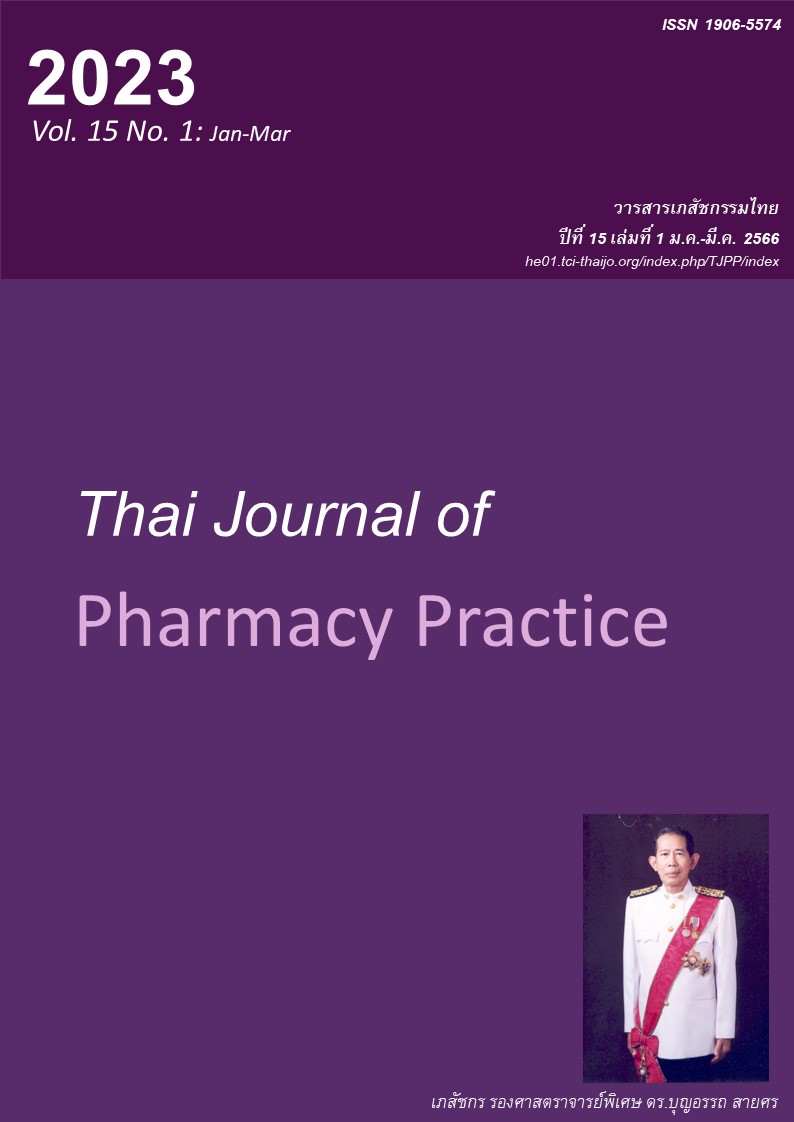การพัฒนาแนวทางจัดการเรียนการสอนวิชาทักษะภาษาอังกฤษ ทางเภสัชศาสตร์โดยวิธีการสร้างแผนที่มโนทัศน์
Main Article Content
บทคัดย่อ
วัตถุประสงค์: เพื่อพัฒนาแนวทางจัดการเรียนการสอนวิชาภาษาอังกฤษทางเภสัชศาสตร์โดยวิธีการสร้างแผนที่มโนทัศน์ วิธีการ: รูปแบบงานวิจัยเป็นแบบวิธีวิจัยผสมผสาน ตัวอย่างที่เข้าพัฒนารูปแบบการเรียนการสอนโดยใช้แผนที่มโนทัศน์ ได้แก่ ตัวแทนอาจารย์ผู้สอน 4 คน ตัวแทนผู้บริหาร 1 คน และตัวแทนนิสิต 10 คน ขั้นตอนดำเนินการวิจัย มีดังนี้ การสัมภาษณ์เชิงลึกอาจารย์ผู้สอนวิชาภาษาอังกฤษทางเภสัชศาสตร์เกี่ยวกับปัญหาในการเรียนการสอน การสังเคราะห์ข้อมูลจากเอกสารแบบประเมินรายวิชาโดยนิสิต 120 คน การจัดประชุมตัวแทนอาจารย์ผู้สอน ผู้บริหาร และนิสิต เพื่อระดมสมองเสนอความคิดในการแก้ไขปัญหา การนำข้อมูลการจัดกลุ่มไปวิเคราะห์โดยใช้สถิติ multidimensional scaling และ hierarchical cluster analysis เพื่อให้ได้แผนที่มโนทัศน์ ผลการวิจัย: รูปแบบการสอนวิชาทักษะภาษาอังกฤษทางเภสัชศาสตร์ที่ได้จากการสร้างแผนที่มโนทัศน์ ได้แก่ 1) เนื้อหาและการจัดการเรียนการสอน 2) การเตรียมการสอนและการสอบ 3) งานมอบหมาย 4) เอกสารประกอบการสอนและสื่อการเรียน 5) เทคนิคการสอน และ 6) กิจกรรมการเรียนการสอน สรุป: การเรียนการสอนในวิชาทักษะภาษาอังกฤษทางเภสัชศาสตร์ควรเน้นทักษะการพูดในบริบทร้านยา และสร้างบรรยากาศการเรียนที่สนุกสนาน
Article Details

อนุญาตภายใต้เงื่อนไข Creative Commons Attribution-NonCommercial-NoDerivatives 4.0 International License.
ผลการวิจัยและความคิดเห็นที่ปรากฏในบทความถือเป็นความคิดเห็นและอยู่ในความรับผิดชอบของผู้นิพนธ์ มิใช่ความเห็นหรือความรับผิดชอบของกองบรรณาธิการ หรือคณะเภสัชศาสตร์ มหาวิทยาลัยสงขลานครินทร์ ทั้งนี้ไม่รวมความผิดพลาดอันเกิดจากการพิมพ์ บทความที่ได้รับการเผยแพร่โดยวารสารเภสัชกรรมไทยถือเป็นสิทธิ์ของวารสารฯ
เอกสารอ้างอิง
Association of Southeast Asian Nation. Asean Economic Community [online]. 2002 [cited Dec 19, 2021].Available from: www.asean.org/communities/ asean-economic-community.
The Nation. Thailand ranks near bottom in English proficiency: Bangkok survey [online]. 2013 [cited Dec 19, 2021]. Available from: www.nationmultime dia.com/business/Thailand-ranks-near-bottom-in-English-proficiency--30218895.html.
National Statistical Office of Thailand. National Statistical Office of Thailand shows survey results about private hospital and infirmary [online]. 2018 [cited Dec 19, 2021]. Available from: www.nso.go. th/sites/2014/Pages/News/2561/N24-10-61.aspx.
Health Focus News Agency. The drug store, the first option of consumers due to long que for public hospitals and expensive cost for private hospitals [online]. 2017 [cited Dec 19, 2021]. Available from: www.hfocus.org/content/2017/03/13642.
Bradshaw M, Tomany-Korman S, Flores G. Langu- age barriers to prescriptions for patients with limited English proficiency: a survey of pharmacies. Pedia- trics. 2007; 120: e225-e35.
Phokeo V, Hyman I. Provision of pharmaceutical care to patients with limited English proficiency. Am J Health Syst Pharm 2007; 64: 423-9.
Announcement of the Ministry of Education in 2009 on Thai qualification framework in higher education B.E. 2552. Royal Gazette No. 126, Part 125D special (Aug 31, 2009).
Announcement of the Ministry of Education in 2015 on Qualifications bachelor’s degree in pharmacy B. E. 2558, Royal Gazette No. 133, Part 7D special (Jan 12, 2016).
Novak JD, Cañas AJ. The theory underlying concept maps and How to construct and use them [online]. 2008 [cited Dec 19, 2021]. Available from: cmap.ihmc.us/docs/theory-of-concept-maps.
Trochim WMK. An introduction to concept mapping for planning and evaluation. Eval Program Plann 1989; 12: 1-16.
Rosas SR, Kane M. Quality and rigor of the concept mapping methodology: a pooled study analysis. Eval Program Plann. 2012; 35: 236-45.
Scahill SL, Harrison J, Carswell P. What constitutes an effective community pharmacy?—development of a preliminary model of organizational effective- ness through concept mapping with multiple stakeholders. International J Qual Health Care. 2010; 22: 324-32.
Daiaz M. English for pharmacy writing and oral communication. Philadelphia: Wolters Kluwer/Lip pincott Williams & Wilkins; 2009.
Kawano M, Skier EM, Takeuchi F, Horiuchi M, Kaneko T. English education at schools of pharmacy in Japan: meeting curricular needs through authentic ESP materials. Asian EFL J 2013; 15: 356-65.
Ibrahim ZS, Hassali MA, Saleem F, ul Haq N, Khan TM, Aljadhey H. Perceptions and barriers towards English language proficiency among pharmacy undergraduates at Universiti Sains Malaysia. Pharm Educ 2013; 13: 151-6.
Syakur A, Zainuddin H, Hasan MA. Needs analysis English for specific purposes (ESP) for vocational pharmacy students [online]. 2020 [cited Dec 19, 2021].Available from: www.bircu-journal.com/index .php /birle/article/view/901/0
Alkhuzaee FS, Al-Mehmadi AA, Al-Sehly AA, Nahari MH, Al-Muwallad MA, Ali M. Identifying the facilita tors and barriers for scientific writing among pharmacy students in College of Pharmacy, Umm Al-Qura University – A qualitative study. Curr Pharm Teach Learn 2019; 11: 1265-73.
Coroban C. Teaching English to pharmacy students: resources, importance and applications. Analele Universităţii Ovidius din Constanţa Seria Filologie. 2019; 30: 44-56.
Xiao-xia H. On cross-curriculum English teaching for pharmacy majors. Journal of Yuncheng University. 2011; 29: 93-5.
Methaneethorn J, Sudchada P, Insuk S. Game-based learning for teaching English to Thai pharmacy students. Kasetsart J Soc Sci 2021; 42: 617–22.
Kosasih FR. English materials and their relevance to the needs of pharmacy students: A case study at a school of pharmacy in Bandung–Indonesia. Asia TEFL J Aust 2017; 97: 4-27.
Diaz-Gilbert M. Vocabulary knowledge of pharmacy students whose first or best language is not English. Am J Pharm Educ 2004; 68: 1-8. p. 1–8, 2004. DOI 10.5688/aj680491.
Long AJ, Ingram MJ, Pugh WJ, Bowes P, Haigh S, Moss GP. The effect of language background on teaching and learning in the master of pharmacy degree. Pharm Educ 2008; 8: 45-52.
Stupans I, March GJ, Elliot EE. Pharmacy students’ English language skill development: are we heading in the right direction? Pharm Educ 2009; 9: 6-10.
Sasum S, Weeks B. Why some Thai students cannot speak English fluently [online]. 2018 [cited Dec 19, 2021]. Available from: rsucon.rsu.ac.th/pro ceeding/article/139.
Ahmeda I, Hamzah A, Abdullah MN. Effect of emotionally positive classroom atmosphere on student social-emotional competence. Int J Innov Creat Change 2020; 12: 320-39.
Wei Y, Zhou Y. Insights into English pronunciation problems of Thai students [online]. 2002 [cited Dec 19, 2021]. Available from: eric.ed.gov/?id=ED476 746.


